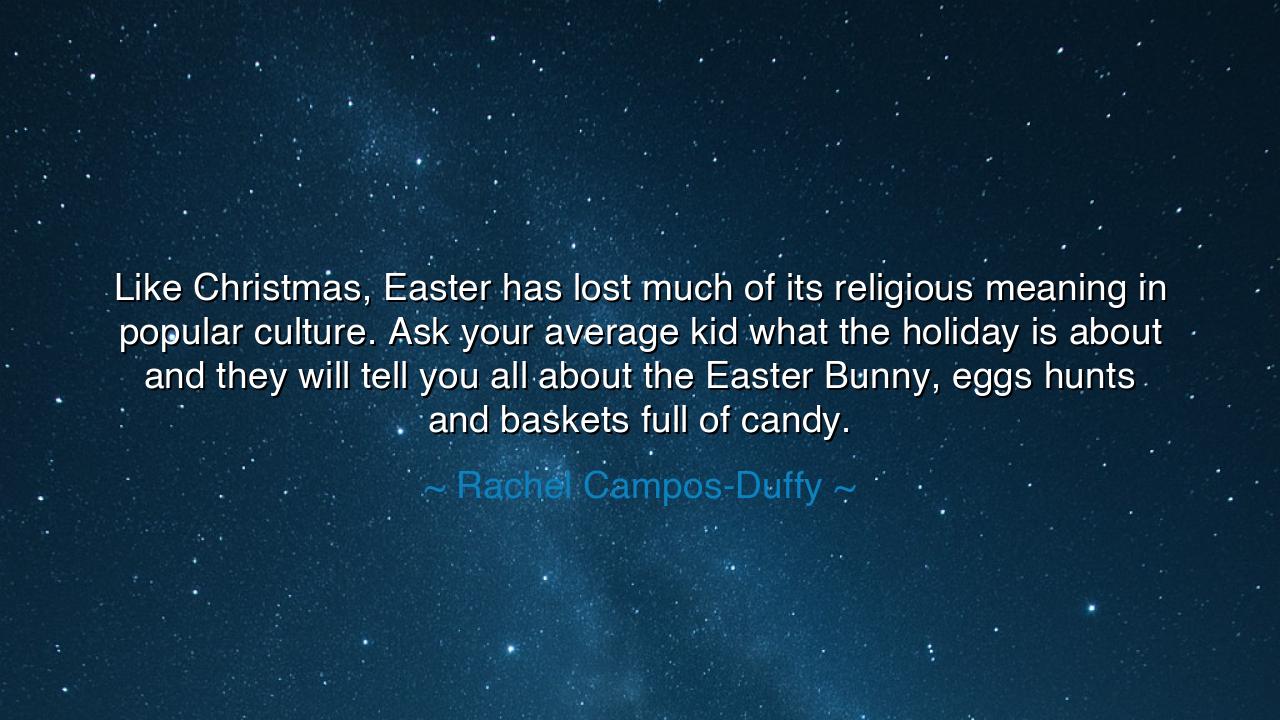
Like Christmas, Easter has lost much of its religious meaning in
Like Christmas, Easter has lost much of its religious meaning in popular culture. Ask your average kid what the holiday is about and they will tell you all about the Easter Bunny, eggs hunts and baskets full of candy.






In the reflective and heartfelt words of Rachel Campos-Duffy, we hear a lament and a call to remembrance: “Like Christmas, Easter has lost much of its religious meaning in popular culture. Ask your average kid what the holiday is about and they will tell you all about the Easter Bunny, egg hunts, and baskets full of candy.” These words, though spoken with gentleness, strike at the heart of a profound truth — that in the rush of modern life, the sacred has been veiled by the glitter of the trivial. She does not condemn joy or festivity, but mourns the forgetting — the quiet drift of humanity away from the deep spiritual roots that once nourished both Easter and Christmas, the two luminous pillars of the Christian faith.
The origin of this quote lies in Campos-Duffy’s reflection as a mother, cultural commentator, and woman of faith, observing the way modern society has transformed holy days into holidays — moments of consumption rather than contemplation. In her observation, the symbols of Easter, once profound metaphors of rebirth and salvation, have become ornaments of commerce: bunnies, baskets, and sweets. Her concern is not with the symbols themselves, for even ancient traditions used them to teach, but with the forgetting of their deeper meaning. What once pointed to the divine now points only to desire. What once was sacred now risks becoming sentimental.
In this way, her words echo the warning of the ancients, who saw how the soul of a people could be dulled not by evil, but by distraction. Easter, born of the triumph of life over death, of Christ’s resurrection over the tomb, is a festival of renewal — not of the body alone, but of the spirit. Yet as Campos-Duffy observes, popular culture has drifted toward surface pleasures, exchanging depth for delight, sacrifice for spectacle. The Easter Bunny, with his innocent charm, has become a mascot for consumption rather than a symbol of renewal. The ancient message — that through suffering comes salvation, and through death, eternal life — is now wrapped in pastel paper and forgotten beneath chocolate shells.
History offers us many examples of civilizations that lost sight of their sacred centers. The Romans, once fierce in their reverence for duty and virtue, turned their holy festivals into spectacles of indulgence — the feasts of Bacchus and Saturnalia replacing discipline with decadence. When reverence decayed, so too did their empire. Campos-Duffy’s words carry the same warning for our time: that when a people forget the meaning of their celebrations, they begin to lose the thread of their spiritual identity. For festivals are not merely days of rest — they are the rhythm of the soul, the songs that remind us of who we are and what we believe.
And yet, her message is not one of despair, but of awakening. The Easter Bunny and the egg hunts need not be cast away; they may yet serve as doorways to truth if guided by wisdom. The egg, after all, has long symbolized new life, the sealed tomb broken open into resurrection. Even the joy of children at play can reflect the greater joy of renewal that Easter proclaims. But for this to happen, parents, teachers, and communities must once again become storytellers — guardians of meaning. They must teach their children not only to rejoice in the egg, but to understand what hatches within it.
The heart of Campos-Duffy’s insight lies in this: that faith, like any living thing, withers when neglected and flourishes when tended. To restore the religious meaning of Easter and Christmas, one must return to the story itself — to the light of dawn at the empty tomb, to the hope that overcomes despair, to the mercy that triumphs over death. In doing so, families may reclaim not just tradition, but transcendence. For when the soul remembers, the festival becomes holy again — a bridge between earth and heaven, between past and eternity.
So, let this be the lesson to all who listen: do not let the sacred fade into mere celebration. Teach your children the deeper story behind the laughter and the sweets. Let Easter once again be the festival of resurrection, where hearts are lifted as surely as the dawn rises over the world. Let the Easter Bunny be a servant of joy, not its master. And in every egg, in every bright song, remember that these are but reflections of a far greater light — the light of renewal, faith, and hope that no darkness can ever overcome.
Thus, in the voice of Rachel Campos-Duffy, we are reminded that the soul of a holiday is the soul of a people. When faith lives, even simple traditions shine with divine meaning. But when faith fades, even the grandest celebration becomes hollow. Therefore, guard the sacred, honor the story, and let the joy of Easter — not the candy, but the resurrection — fill your heart anew each spring, as it has filled the hearts of generations before us.






AAdministratorAdministrator
Welcome, honored guests. Please leave a comment, we will respond soon